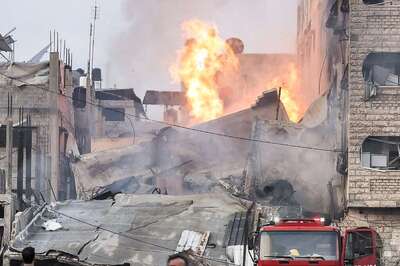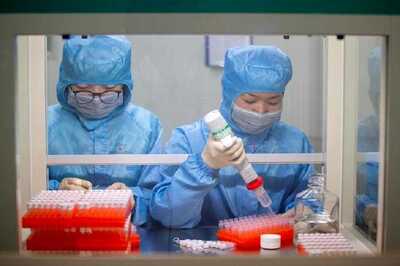
views
New Delhi: The biggest electoral exercise in the world - the Indian general elections - just got even bigger. On Sunday Chief Election Commissioner, Sunil Arora, announced the schedule of polls to elect members of the 17th Lok Sabha.
Beating the record for longest elections in India, the last general polls that were spread over 35 days, voting in the upcoming polls will start from April 11 and end on May 19 — an exercise lasting 38 days.
Against 81.4 crore people, who were eligible to vote in the last elections, 8.3 crore more voters have been added this time, taking the number of voters to 90 crore. In other words, there are now more voters in India than there are people in Europe and Russia combined.
To understand what this exercise will bring and what's changed in these elections itself, let us look at the five major points made in the press conference by CEC Sunil Arora on Sunday.
1. EVMs
For the first time ever, in a move to instill faith among millions of voters across the country, Voter verifiable paper audit trails (VVPATs) will be used in all polling stations in the upcoming Lok Sabha elections.
CEC Sunil Arora announced this decision in his press conference held in the capital on Sunday. EVMs had come under intense criticism, especially by opposition parties.
"EVMs are being used in this country for over two decades," Arora said in response to a question. Without taking names, the CEC took the instance of Delhi. Interestingly, Delhi CM Arvind Kejriwal had alleged EVM tampering in Punjab assembly elections.
"Take the case of elections in Delhi. You have x result in Parliamentary elections and y result in assembly results...Let us remember that the entire process of EVMs was initiated in the 80s. The day-to-day technical monitoring of EVMs is being done by an expert committee," Arora added.
He said that a team of senior professors and experts from IITs were members of this expert committee. "This committee is functioning since 2010. There is no link with 2014 or 2016. We have also got a hearty endorsement for EMVs from courts also. Random counting of votes has been in front of political parties. Experts from ISI have been appointed and they will give a report soon," Arora highlighted measures taken to prove flawless functioning of EVMs.
Several opposition leaders, including Mamata Banerjee and Mayawati, had raised questions about 'mischiefs' in the EVMs. The EC's move to install paper trails in the polling booth can be seen as a huge confidence building measure among voters and parties across the spectrum.
2. Eight crore Thirty four lakh first-time voters
The second significant announcement made by Arora was about the inclusion of 8.43 crore new voters in the rolls. Of these 8.34 crore, 1.5 crore are 18 to 19 year olds.
First-time voters are a huge number and possibly unpredictable political constituency unto themselves. They are understood to be tech-savvy and better informed, who may break political loyalties running in their families/communities. How the youngest lot in this bunch of first-time voters cast their ballot will partly be based on their lived experience.
They may have not seen the '99 Kargil war, but as children may have some memories of the 26/11 Mumbai attack of 2008, the agitation over Nirbhaya gang rape and murder case, the huge anti-corruption movement that unseated governments in Delhi and in centre, the huge mandate with which BJP came to power in '14, the decriminalisation of gay-sex, and the two surgical strikes.
Focus of several parties therefore is in targeted social media campaigns.
3. Social Media Regulation
Given the increasing internet penetration in the country and the increasing number of young voters, EC announced several measures to monitor and regulate content being spread on the next big campaigning medium - social media.
Social media platforms have told the Election Commission that they have appointed dedicated officers to take necessary and prompt action against malicious content published on their platforms, Arora told reporters in his press conference on Sunday.
The EC has also committed to taking action on any complaint reported by the designated officers of the Election Commission of India (ECI). Arora also mentioned that “the Internet and Mobile Association of India in consultation with ECI is formulating a set of code of ethics, this is a work in progress.”
Arora told reporters that, “Google and Facebook have announced verification of the political advertisers and ad archives with reference to ad buying on social media.”
4. Kashmir
To understand the challenge before the EC in conducting elections in J&K, it will be sufficient to note that for the first time in Indian history one Parliamentary constituency - Anantnag - in South Kashmir, will see polls conducted in three phases. So low has the turn outs been in the valley and so disturbed the law and order situation that the EC decided to not even conduct the scheduled assembly polls in the state.
Leaders from various parties in J&K strongly criticised the EC's move to hold Lok Sabha elections but defer elections for the state assembly.
Some leaders like NC's Devender Rana described the decision to defer state elections in J&K as a "himalayan blunder", others like PDP's Naeem Akhtar called it "a murder of democracy".
Given the unrelenting violence in form of regular encounters that the state has seen since July 2016 with the death of Hizbul Mujahideen militant Burhan Wani, protests against jailing of separatists, NIA raids, crackdown on Jamaat-e-Islami, the Pulwama attack, unrest over article 370 and 35A, the EC will have perhaps its toughest assignment in this state.
5. Phase distribution
The manner in which the EC has decided to increase phases in which elections will be held in several states could become a talking point in days to come.
While overall number of phases have come down from 9 in ‘14 to 7 this time, the decision to increase phases in certain states like MP where elections have been spread over 4 days, will generate some curiosity.
Odisha may be the most curious case. In 2014, elections here were conducted over 2 phases; for 2019, the EC has decided to conduct the election here, which has so far no reported any big law and order incident, over 4 phases.
The number of phases have been increased in cases of Maharashtra (4 phase), Uttar Pradesh (7 phase) and West Bengal (7 phase).
In case of WB, while there may be law and order challenges given constant cases of political violence, but spreading elections in WB over 7 phases may become a point of controversy and debate in the coming days.



















Comments
0 comment